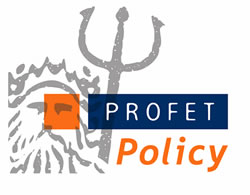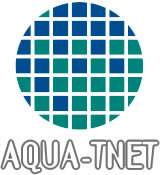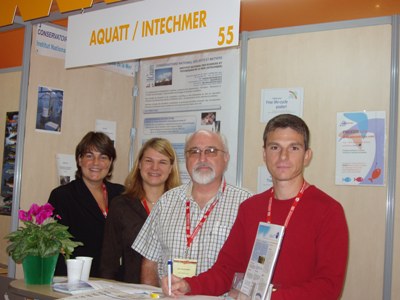

AquaTT Training News - October 2006
Author: AquaTT
Date: 27 Oct 2006
 |  |
A free e-mail news service provided by AquaTT on European Education & Training in Aquaculture.
Please submit any relevant information for dissemination in the newsletter to news@aquatt.ie
About AquaTT
- New Masters Program: ‘Intelligent Coast, new tourist strategies, new territorial structures', Universitat Politècnica de Catalunya, Spain. 1st edition January 2007
- AQUALAB Student Conference 2006. New Marine Institute headquarters, Oranmore, Co. Galway, Ireland. 2-4th November 2006
2. Collaboration
- PROFIT POLICY. Debating and influencing fisheries & aquaculture policy
- AQUA-TNET core group meeting, Bergen, Norway, 17th -19th September 2006
- Carrying Capacity Conference, Westport, Ireland, 28th September 2006
3. Announcements
- FISHPROM EXPO 2006, 31st October – 3rd November 2006, Moscow, Russia
- International conference: The EU Green Paper on a Future European Maritime Policy - The Objectives, Potential Implications and Challenges – , 8th November 2006, New Marine Institute headquarters, Oranmore, Co. Galway, Ireland.
- Conference and exhibition: Exploring Atlantic Ireland, 8th - 9th November 2006
- New initiative of Aquaculture without Frontiers
- International workshop on Perkinsosis, September 2007, Vigo, Spain.
- Vacancy of the South Wales Sea Fisheries Committee: Fishery Officer (Carmarthenshire Area)
- Clew Bay - The AquaReg Coastal Zone Management Project
- Post your student placement, MSc/ PhD positions and temporary/permanent vacancies in Aquaculture, Fisheries and Marine Science on WWW.PISCESTTJOBS.COM
Education
New
Masters Program: "Intelligent Coast, new tourist strategies, new
territorial structures', Universitat Politècnica de Catalunya, Spain.
1st edition January 2007
The Master Program is part of the academic offer of Fundació Politécnica of Catalonia (FPC -UPC) and will start January 2007.
Aim of the Master Program is to provide a framework for theoretical and practical exchange aimed at articulating a transverse view of the phenomenon of tourism and its impact on the landscape through research on new models of intervention and guidance and the participation of the various disciplines and stakeholders involved. Another aim is to consolidate a national and international research network focused on the analysis and redefinition of certain paradigmatic tourism scenarios, such as specific case studies.
This one-year master's programme is divided into three quarters. In the first quarter, students learn about and analyse the coast and the phenomenon of tourism using advanced digital techniques like geographic information systems (GIS). The second quarter is a transdisciplinary exploration of various models of tourism, from their political and economic development to their city-planning and architectural characteristics. Students analyse not only Mediterranean models but also those of natural competitors in the Caribbean and the Asian Pacific. In the third quarter, students apply the knowledge they have acquired during the programme to a comprehensive project involving a real case study. Each quarter is divided into a theoretical/active segment and proactive practice segment. Class time is complemented by workshops, seminars, field trips and lectures open to the general public.
For more information on administrative aims please contact:
Joana Mireia Cervera Garcia
Plaça Eusebi Güell, 6
08034 Barcelona
Tel. 93 401 2512 Fax. 93 401 18 73
Joana.Cervera@fundacio.upc.edu
For further information visit: http://www.intelligentcoast.es
Source: AquaTT
Back to top
AQUALAB Student Conference 2006
New Marine Institute headquarters, Oranmore, Co. Galway, Ireland. 2-4th November 2006
The
Aqualab Student Conference 2006 is fast approaching. The seventh and
final AQUALABS Training event will be the biggest so far with 60
participants. The venue will be the impressive new Marine Institute
headquarters, Oranmore, Co. Galway, Ireland, 2-4th November 2006. The
event is funded by the European Union Marie Curie program and there are
part-funded places for 60 young researchers to participate. The three
day student event will provide an opportunity for young researchers to
share experiences, explore new fields and learn new skills.
Top researchers
require a range of competencies in addition to their research skills.
This event is intended to cover 3 areas of relevance to young
researchers in aquaculture:
1. Profiling current research and training
2. Highlighting horizontal issues for scientific research
3. Enhancing participants’ complementary skills, e.g. communication, proposal writing, networking
The conference will be made up of 2 days of innovative sessions and activities, such as an assessment of communication styles for presenting research and networking, identification of where research fits into the aquaculture sector & where aquaculture fits into society, and an overview of student mobility, technology transfer & grant-based studying. On the 3rd day there will be a field trip to local aquaculture facilities, research stations and a cultural venue.
For further information visit: www.aquatt.ie
Source: AquaTT
 PROFET
POLICY’, a new EU-funded project, is to organise 9 trans-national
workshops, during the next 2 years, covering policy issues within the
aquaculture and fisheries sector throughout Europe. This initiative
will provide an important forum for the exchange of views between
National and European policy makers and stakeholders. Through active
participation, these events will provide the Commission with clear
recommendations for actions providing scientific support to policy.
PROFET
POLICY’, a new EU-funded project, is to organise 9 trans-national
workshops, during the next 2 years, covering policy issues within the
aquaculture and fisheries sector throughout Europe. This initiative
will provide an important forum for the exchange of views between
National and European policy makers and stakeholders. Through active
participation, these events will provide the Commission with clear
recommendations for actions providing scientific support to policy.Tel: +32 4 3382995
Email: secretariat@feap.info
AQUA-TNET core group meeting, Bergen, Norway, 17th – 19th September 2006
From
the 17th till the 19th of September 2006, AQUA-TNET partners
representing the work packages regarding ‘Masters and Masters of
Science curriculum development’ and ‘Transparency in Teaching and
Education’ held their first core group meeting in Bergen, Norway. A
workshop titled: “Internationalising Aquaculture and Fisheries Degree
Programs in Europe: Practical solutions to enhance collaboration� was
also carried out during this time. AQUA-TNET
is the Socrates educational thematic network, consisting of more than
100 partners representing universities, training organisations,
associations and research performers working in the area of
aquaculture, fisheries and aquatic resource management. The
meeting provided an opportunity for core group members to meet and to
exchange ideas and experiences regarding the EU reforms in the European
Area of Higher Education and European Research Area. The meeting was a
big success, with more than 25 partners from across Europe travelling
to Bergen to discuss how to educate the network, and position the
network, in light of new policies from the European Commission. Given the diversity of opinions in Europe today on
the way educational programs are organised, both between disciplines
and countries, representatives from each partner country elaborated on
how policies are influencing the educational system in their country
and how university studies are now being organised. With the proceedings of this core group meeting now complete, AQUA-TNET is now preparing to launch a new website. Details of this launch will be forthcoming. I
would like to take this opportunity on behalf of AquaTT to thank Karin
Pittman, Jan Petter Myklebust and Jorunn Blindheim of the University of
Bergen for their hospitality and assistance with the organisation of
the event. For more information: aquatnet@aquatt.ie or marieke@aquatt.ie Carrying Capacity Conference, Westport, Ireland, 28th September 2006 More
than 70 delegates travelled to Westport, Co. Mayo, to participate in
the Carrying Capacity Conference on 28th September. Participants
travelled from all parts of Ireland, the UK, Netherlands, Portugal and
Norway, to listen to a host of international speakers who presented
pertinent aspects of carrying capacity studies as applied to sea areas,
with a particular focus on shellfish aquaculture and fisheries. The
conference was organised by Aqua TT on behalf of Clew Bay Marine Forum,
South East Shellfish Co-op and La Tene Maps, who are the Irish
representatives in the EU Cooperative Research Carrying Capacity
Project, KEYZONES. The one-day conference was generously sponsored by
Bord Iascaigh Mhara and the Marine Institute. The
opening session was chaired by Mr. John Coleman, a director of Aqua TT
and chief executive of La Tene Maps. He introduced the first speaker
Mr. John Perry TD, opposition Fine Gael spokesperson on the marine. Mr.
Perry made a brief policy speech and formally opened the conference. The
first presentation was given by Dr. Brendan O'Connor, a director of
Aquafact International, who gave an important overview titled "What is
Carrying Capacity?" which established a solid base for the remainder of
the day’s discussions. This aimed to define, in straightforward
terms, the elements involved in a carrying capacity study at its most
basic level. This was followed by Mr. Ben Dallaghan of BIM who outlined
the organisation’s plans for the future. After
the break, Mr. Declan Clark, of the Martin Ryan Institute, NUI Galway,
chaired the second session which concentrated on individual components
of a carrying capacity study, such as “Shellfish Modelling and
Carrying Capacity� presented by Phil Pascoe from Plymouth Marine
Laboratory. This theme was continued by Aad Small, from RIVO in the
Netherlands, with his talk on biological modelling. Ms. Ana Sequeira,
from the Institute of Marine Research in Portugal, then detailed the
role of GIS in carrying capacity studies which was quite important as
the mechanism through which to demonstrate results. The session was
completed by Mr. Marcel Cure who outlined the Marine Institute’s plan
for carrying capacity studies and a presentation by MarCon, titled
“Carrying Capacity Studies for Mussel and Scallops in Coastal
Areas�. The
afternoon session, chaired by Mr. Mark Norman of Taighde Mhara, was
devoted to examples of carrying capacity projects SMILE, (Northern
Ireland), KEYZONES (Ireland, Scotland, Netherlands) and ECASA
(Europe-wide), represented by Mr. Matt Service of AFESD, Mr. Dennis
Gowland of Research Relays, Mr. Anouk Blauw of Delft Hydraulics, and
Mr. Thom Nickell of SAMS. The final speaker of the session was Mr.
Niall O' Boyle from Clew Bay Marine Forum who shared the perspective of
a small SME working on a carrying capacity project. A
lively question and answer session, chaired by Mr. Richie Flynn of IFA
Aquaculture, was an appropriate end for a very productive day. Speaking
after the conference, organiser John Coleman said "I think that
everyone was happy with the level and quality of the talks. I had asked
the speakers to keep things appropriate for a diverse audience of
stakeholders and government agency people.� He
continued, “The speakers were pleasantly surprised both at the
turnout and also the genuine interest by the Irish attendees in the
experiences from other areas. As most of the studies presented are at
an intermediate stage and ongoing, there were calls for a follow-up
conference to look at the results in about two years time. This is
something that Aqua TT will actively consider." Downloadable files of the conference proceedings are available from the events section of the Aqua TT website, www.aquatt.ie. Final workshop WAVE project, Lyon, France, 27-29th September 2006
The
WAVE project had a stand to communicate and diffuse information about
the WAVE program and promote the activities of the respective
organisations present. In
addition the project held a small workshop presenting the WAVE program
which was attended by about 30 people. There was a lengthy discussion
with participants and the feedback was very positive. More information on the WAVE project can be found at www.waveproject.com
The first PESCALEX meeting took place in Dublin on 16-17th November, and was attended by Mrs M.Eleftheriou (AMC), Dr P Christofilogiannis (AQUARK), Ms L Fraga (CETMAR), Mme C. Desmarais, Mme C. Goulletquert (LYCEE), Ms. E.McVeigh (AquaTT), Dr W. O'Connell (Bergen), and Professor R.Trebaziatowski (SZCZECIN) 
 The
WAVE project is coming to the end of its 3 year funded period under the
EC Leonardo Da Vinci programme. The aim of the WAVE project was to
identify and recognise the skills and knowledge needed for work in the
European Aquaculture sector (primary production only) using a
competency based approach. WAVE has produced a Master List of
competencies covering all the main European farmed species and
production techniques along with a set of guidelines on how to use WAVE
in a variety of ways from assessing training needs to carrying out job
interviews. The Master list and WAVE guidelines will shortly be
available in 10 EC languages as well as an online tool for customising
the list to your farm or training course. More information on the WAVE
project and to find out how you can get a copy of the guidelines visit
the WAVE project website, www.waveproject.com
The
WAVE project is coming to the end of its 3 year funded period under the
EC Leonardo Da Vinci programme. The aim of the WAVE project was to
identify and recognise the skills and knowledge needed for work in the
European Aquaculture sector (primary production only) using a
competency based approach. WAVE has produced a Master List of
competencies covering all the main European farmed species and
production techniques along with a set of guidelines on how to use WAVE
in a variety of ways from assessing training needs to carrying out job
interviews. The Master list and WAVE guidelines will shortly be
available in 10 EC languages as well as an online tool for customising
the list to your farm or training course. More information on the WAVE
project and to find out how you can get a copy of the guidelines visit
the WAVE project website, www.waveproject.com

Startup meetings of pilot projects are particularly important, even when partners know one another, and have previously worked together. The nature of the pilot project implies innovation, and aspects of innovative processes sometime require a lot of spelling out. In PESCALEX, it is the CLIL methodology (Content and Language Integrated Learning) that is not familiar to the content specialists in the partnerships. The meeting therefore began with a presentation on the PESCALEX Concept, demonstrating the relevance of the PESCALEX language project to the aquaculture curriculum.
The CLIL methodology is well suited to the narrowly- focused subject area of Fish Diseases, with its simple language structures, the high level of knowledge of complex terminology, and the need for fast recognition of disease symptoms. There is a good chance of success in this project, because it is based on Beginner and Basic Level online Language lessons which have already been tried and tested in English, Greek, Portuguese and Swedish. It will be our task to adapt and translate them into French, Spanish, Norwegian and Polish.
The Fish Diseases Glossary will also form a major part of PESCALEX, with the terms and definitions being taken from the AQUALEX database. The first draft is already available, totalling 1472 items, which we hope to finalise by the end of the year so that translation into Polish can begin as soon as possible.
The new module concerns Fish Diseases, and at the Startup meeting it was decided that the partner responsible Dr Christofilogiannis (AQUARK) should focus on 6 main species relevant to European industry. We are to decide on these species later. We had been sent the courses "Basic Techniques in Fish Haematology", "Fish Health Management" and "Cost Effective Feeding of Fish". The latter, even though it is the longest module, should have new material on turbot which BERGEN will produce.
We spent a long time discussing how to plan the final Teacher Training Workshop (target audience, venue, timing, suitability of methodology for teacher training). Venue: Lycee de la Mer et du Littoral, in Bourcefranc le Chapus in France, despite its rather remote location. Time for the workshop-June 2007. It was decided to delay the choice of target audience, as CLIL method is still very innovative, and much may depend on the willingness of teachers and/or students to act as guinea pigs in this pilot project.
FISHPROM EXPO 2006
October 31st – November 3rd 2006, Moscow, Russia
FISHPROM-EXPO
2006 represents the uniform branch exhibition project, that covers all
spectrum of questions the Fish industry and organized on the basis of
the fishing exhibitions spent earlier on the territory of the
All-Russian Exhibition Center.
Within the framework of the Exhibition FISHPROM-EXPO 2006 there
will be held the practical scientific conference and contests upon the
following nominations: The best samples of fish and seafood production;
Innovations in fish industry; The best technologist of industry; The
best collective organizer, The Best stand of an exposition and others.
For more information, see website:
http://www.vnierkh.ru/expo/vist-engl_06.htm
International
Conference: The EU Green Paper on a Future European Maritime Policy -
The Objectives, Potential Implications and Challenges
November 8th 2006, Galway, Ireland
<< Back

